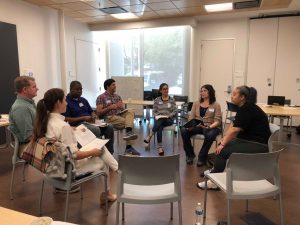New story in American Medical Association’s microsite, End the Epidemic
 People with acute and chronic pain, especially those who are underserved, face significant challenges accessing person-centered, multidisciplinary, comprehensive integrative pain management. This bulletin is focused on multi-stakeholder efforts – innovation, progress, and opportunities – to improve access to integrative pain care for people who are underserved.
People with acute and chronic pain, especially those who are underserved, face significant challenges accessing person-centered, multidisciplinary, comprehensive integrative pain management. This bulletin is focused on multi-stakeholder efforts – innovation, progress, and opportunities – to improve access to integrative pain care for people who are underserved.
“We know from best practices that patients’ pain care must be individualized, so we created our own program that – based on their preferences – allows them to choose from a larger toolkit,” Dr. Kohli said.
Read the story on AMA’s microsite, titled Texas FQHC develops integrative model to help patients with pain, by Dr. Sharad Kohli, family physician at People’s Community Clinic, an FQHC in Austin, Texas.
One Example of a Growing Many – Need to Find, Coordinate and Share Tools

Group medical visit at People’s Community Clinic, Austin, TX (see studies below next to IM4Us logo)
This example is certainly not the only one. Others are leading innovative efforts in FQHCs and Medicaid programs, using best practices that had been shared over the years through the Integrative Medicine for the Underserved (IM4US) Conference, as well as the California Health Care Foundation’s 2016 White Paper on effectively treating pain in the safety net.
You can read and hear the story of the Integrative Pain Management Program at Tom Waddell Urban Health, an FQHC in San Francisco.
When the HHS Pain Management Best Practices Inter-Agency Task Force report was released in May 2019, Dr. Kohli told us its recommendations “were validating as they lined up with what we had been building, that we were essentially adhering to best practices.”
 A recent report from the National Governors Association illustrated many states that are leaders in seeking new approaches to pain management and being recognized for innovative approaches in their Medicaid programs.
A recent report from the National Governors Association illustrated many states that are leaders in seeking new approaches to pain management and being recognized for innovative approaches in their Medicaid programs.
So Why is Access to Integrative Pain Care Such a Challenge?
 We thank Congress and HHS for their efforts to address ways to improve access to comprehensive, person-centered, evidence-based, interdisciplinary pain care. Since 2016, Congress has passed legislation CARA, 21st Century Cures and the SUPPORT Act, which became law in October 2018, largely adopting evidence-based strategies and promoting a public health approach.
We thank Congress and HHS for their efforts to address ways to improve access to comprehensive, person-centered, evidence-based, interdisciplinary pain care. Since 2016, Congress has passed legislation CARA, 21st Century Cures and the SUPPORT Act, which became law in October 2018, largely adopting evidence-based strategies and promoting a public health approach.
And more directly about care for people with pain, HHS Pain Management Best Practices Task Force released its seminal report in 2019, which includes a breadth of information that highlights the opportunities and barriers to improve access.
Despite the progress, people with pain continue to be marginalized without proper access to providers who understand the range of pharmacological and non-pharmacological options that are appropriate. We must keep pushing ahead and connecting the right stakeholders so that clinical guidance can be implemented effectively for all people.
Regarding access and utilization of a wider toolbox of therapies for people who are underserved, we respectfully suggest that Congress and HHS agencies consider having:
- HRSA direct Bureau of Primary Health Care and National Association of Community Health Centers to perform a systematic survey of Federally Qualified Health Centers about their current offerings and barriers to integrative pain care in primary care settings.
- AHRQ request definitional clarification from the key constituencies about Integrated Pain Management by accepting written proposals and/or empaneling an Advisory Work Group to hear recommendations from a comprehensive cross-section of patients and stakeholders in the medical, psychosocial, and complementary and integrative pain management disciplines. See AACIPM sign-on letter to AHRQ here.
- FDA ensure that the full range of conventional and non-mainstream evidence-based tools for pain management are properly included in its REMS education to help break the cycle of “either/or”(pharmacological or non-pharmacological) and change the paradigm towards a more integrated and integrative approach for people with pain earlier in the process.
We can shine a light on the innovation and progress and work together to find solutions that will improve access to person-centered, comprehensive integrative pain care for all.
Some Recent Presentations and Resources on this Topic – Moving the Needle
 During AACIPM’s fall symposium, Equity in Access to Comprehensive Integrative Pain Management for People with Pain, we heard:
During AACIPM’s fall symposium, Equity in Access to Comprehensive Integrative Pain Management for People with Pain, we heard:
- An Example from a Federally Qualified Health Center
- Whole Health Care in the VA, a Spotlight
- Optum Data about Access to Pain Therapies Based on Zip Code
- Report from National Governors Association – Increasing Access to Non-Opioid Options for Pain
- Current Changes and Priorities in Medicaid
- An Interactive Discussion about Access to Acupuncture
- Whole Health in the States initiative – expanding whole person care for underserved populations
- Results from US Pain Foundation’s Patient Survey about barriers to multidisciplinary pain management
See how the People’s Community Clinic expanded access to effective non-pharmacological treatments in this detailed interview with Dr. Ko
Congressional Briefing about Integrative Care
Dr. Kohli spoke about this topic during the Integrative Health Policy Consortium’s (IHPC) summer congressional briefing, along with Dr. Vanila Singh and led by IHPC’s Caucus Co-Chairs, Congresswoman Judy Chu (D-CA) and Congresswoman Jackie Walorski (R-IN).
Integrative Medicine for the Underserved (IM4Us)
 IM4Us is a member organization open to multidisciplinary clinicians, healthcare staff, researchers, and advocates. They are committed to affordable, accessible integrative health care for all.
IM4Us is a member organization open to multidisciplinary clinicians, healthcare staff, researchers, and advocates. They are committed to affordable, accessible integrative health care for all.
Some of the IM4Us members have authored relevant resources:
- Improving Chronic Pain Care Through Integrative Medicine
- Integrative Group Medical Visits: A National Scoping Survey of Safety-Net Clinics
- The Quadruple Aim as a Framework for Integrative Group Medical Visits
If you have a story or resource to share about innovation and progress in comprehensive integrative pain management, please send to Amy Goldstein, AACIPM Director.
